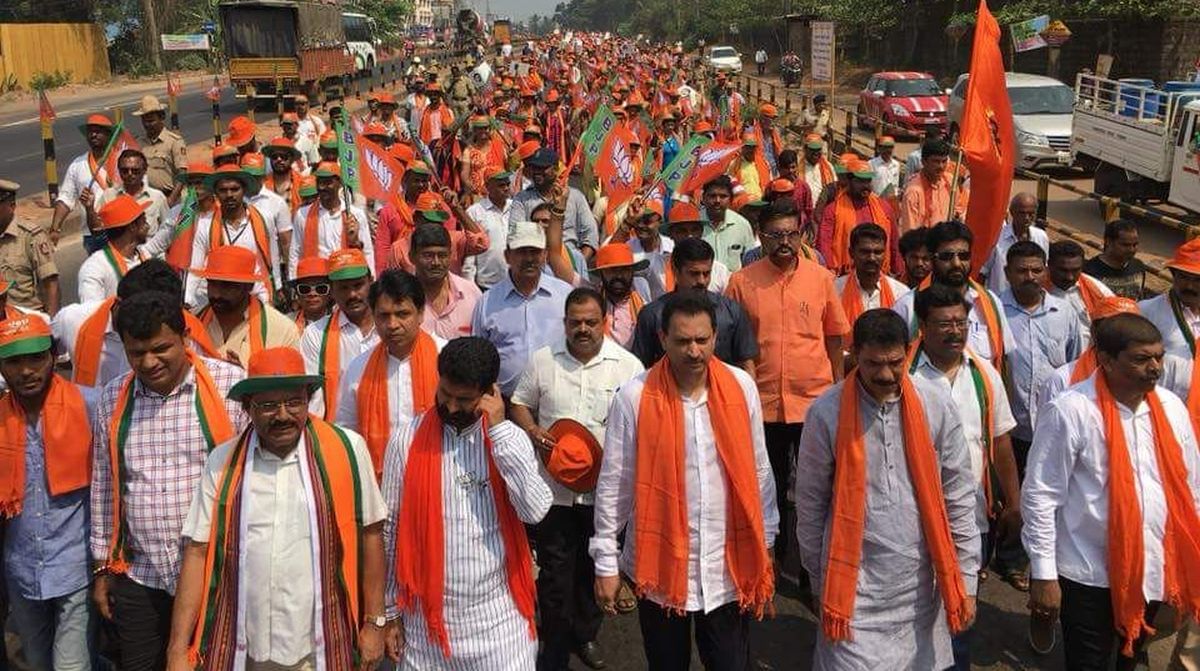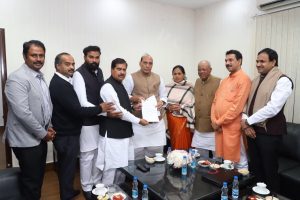The BJP and right-wing outfits used the 2017 death of Paresh Mesta, which they claimed was a communal murder, as a poll issue in 2018.

A BJP rally in 2018 in Karnataka in protest against the alleged murder of Hindutva activists. The BJP used Mesta's case in rallies such as these to claim that the "majority" were being "subjugated" in Karnataka. (Supplied)
Five years after the BJP and right-wing organisations gave the death of Paresh Mesta in Karnataka a communal spin and used it as an election issue, the Central Bureau of Investigation (CBI) has concluded that it was an accidental death.
The CBI filed a closure report in the case suggesting that Mesta’s death was caused due to antemortem drowning. CBI’s report was filed before the local court in Honnavar.
Leaders of the Bharatiya Janata Party (BJP) — then in the Opposition in Karnataka — had alleged that 18-year-old Mesta was “murdered by Jihadist elements”.
Despite repeated clarification by the Karnataka State police that there was no evidence that Mesta was murdered, leaders of the BJP — including incumbent Minister of State for Agriculture Shobha Karandlaje and BJP national general secretary CT Ravi — insisted that Mesta was mutilated, tortured for days and killed by Muslims.
The CBI officials who investigated the case thoroughly, after the then Siddaramaiah-led Congress government transferred the case to the Central agency, have concluded that Mesta was not murdered for communal reasons.

Karnataka BJP leaders met then Union Home Minister Rajnath Singh in December 2017, demanding an NIA probe in the Mesta case. (Twitter/Nalin Kumar Kateel)
The CBI’s Special Crimes Branch, on 27 September, wrote to Paresh’s father Kamalakar Mesta that his son died as a result of drowning, and “no incriminating evidence has emerged showing the involvement of accused persons and the medico-legal evidence/opinion collected from multiple institutions clearly established the cause of death of Paresh Mesta as anti-mortem drowning [sic],” the report stated.
“Accordingly, a final report (Closure Report) has been filed before the jurisdictional court, the Principal Civil Judge (Jr. Dn) & JMFC Honnavar, Uttara Kannada district in Kannada [sic],” the letter — a copy of which is with South First — read.
The BJP and its allied right-wing groups had used the case as an issue in the run-up to the 2018 Assembly elections in Karnataka.
Siddaramaiah failed to get the Congress to a simple majority in the election, and initially, the party formed an alliance government with the JD(S).
It would give the BJP the opportunity to put a foot in the door and topple the government and come to power in the state.
Siddaramaiah felt vindicated by the CBI report.
CBI has, in its report, stated that Paresh Mesta's death was accidental & was not due to murder. This report is a slap on the face of @BJP4Karnataka.
If BJP has any shame left, it should apologise for its slanderous campaign.
— Siddaramaiah (@siddaramaiah) October 3, 2022
The decaying body of 18-year-old Paresh Mesta was found on 8 December, 2017, in a pond in Honnavar, which had witnessed communal riots between Hindus and Muslims on 6 December.
Mesta had been missing since the day of the riot. His disfigured body, decaying due to putrefaction by drowning, was fished out of the pond at Shettikere.
Soon after the news spread through the coastal belt of the Dakshin Kannada district, violence gathered momentum in Honnavar, and even spread to Kumta and Sirsi by 8 December.
On 9 December, Shobha Karandlaje in a media statement released through the BJP Karnataka unit alleged that Mesta was tortured, and that his hand was chopped off.
“Hot oil has been poured on his body resulting in his body turning complete black. This is heinous murder carried out by jehadi elements [sic],” Karandlaje, who was then the general secretary of the Karnataka BJP, alleged.
News outlets like the India Today channel, despite the police denying the charges, propelled the claims.
Other BJP leaders reiterated similar claims, adding fuel to an already simmering communally sensitive Uttar Kannada.
A day after the BJP leaders’ claims were amplified by some news outlets, several police vehicles, including the car of then Inspector General of Police (IGP), Hemanth Nimbalkar, was set ablaze by the violent Hindutva mobs in Kumta.
At least 67 instances of communal tensions and violence were reported in Uttara Kannada alone, with 27 each in Sirsi town and Honnavar. A total of 2,082 people from Hindu and Muslim communities were identified as being involved in communal riots.
The Congress government led by Siddaramaiah arrived in Kumta on 5 December when the communal riots had begun.
The local police arranged for massive security arrangements for the chief minister’s programme.
When the teen’s body was found on 8 December, his father alleged that he was tortured and killed in communal violence.
The BJP claimed that Mesta was killed because he was a Hindutva activist — a claim rejected by Mesta’s family.
BJP leaders staged and spearheaded protests, some of which turned violent — including stone-pelting incidents during the funeral procession of Mesta.
Assembly elections in Karnataka were barely four months away when Mesta died.
The BJP, which had already been accusing the Congress government of allowing Hindutva activists to be killed under its regime, coloured Mesta’s death as a communal murder.
The BJP made the alleged murders of Hindutva activists its poll pitch for the 2018 Assembly elections.
Paresh Mesta’s name featured prominently in the purported list of slain Hindutva activists, in whose name the BJP launched its Jana Suraksha Yatra, led by then MPs Shobha Karandlaje and Anant Kumar Hegde.
Then BJP chief Amit Shah also visited Paresh Mesta’s house during the election campaign and offered condolences to the family.
Paresh Mesta’s father Kamalakar had complained to the police on 8 December that around 9 pm on 6 December, a gang of Muslim men had gathered with a common intention opposite the Goodluck Hotel near the Honnavar bus stand, and suddenly started pelting stones.
He said they used deadly weapons such as iron rod, sword, and sickles to damage temples, shops, and tempos, as well as to assault people.
It was at this time that they brutally killed Paresh Mesta and threw his body in the Shettikere lake to destroy the evidence, he claimed.
The jurisdictional police registered a case under Sections 143 (rioting), 147 and 148 (unlawful assembly), 302 (murder) and 201 (causing destruction/disappearance of evidence) read with Section 149 of the IPC.
They arrested five members of the minority community, including local Congress leader Zamal Azad Annigeri, who was also later expelled from the Waqf Board due to this arrest.
Investigating police officials on several occasions had conveyed that Mesta, caught in the crossfire of communal tensions in Honnavar, fled towards the temple terrace where he was suspected to have slipped and fallen into the adjacent pond.
The police also suspected that Mesta sustained blunt injuries on impact and couldn’t swim despite being an ace swimmer. According to autopsy reports, Mesta — hailing from a fishing community — died due to drowning.
When the police in 2017 concluded that Paresh Mesta died due to drowning, the BJP, Hindutva outfits, and even Mesta’s family rejected the findings.
Under pressure due to several instances of violence, the then Siddaramaiah government transferred the case to the CBI. After nearly five years of investigation, the Central agency reiterated what the police had concluded.
The CBI team, which camped in Kumta to obtain statements from the Mesta family, questioned several people, including journalists who covered the incidents of the mob violence.
The parents of Paresh Mesta and a few others closely related to the case were later summoned twice to Chennai by the CBI for questioning.
5 December, 2017: Communal rioting rocks Honnavar, Kumta, Sirsi and other regions in the Uttara Kannada district due to a road-rage incident involving a Hindu autorickshaw rider and a minority-community bike rider. Subsequently, violence erupts, resulting in stone pelting. Police vehicles are burnt. The cops arrest 14 people involved in the violence.
6 December, 2017: Right-wing activists carry out protests demanding the release of the arrested people. Paresh Mesta, who went fishing at the Shettikere lake, goes missing. His father Kamalakar Mesta lodges a complaint with the local police.
8 December, 2017: Paresh’s body surfaces in the Shettikere lake. His father files a murder case against five Muslim youths, who he says tortured and murdered his son. A post-mortem examination is conducted. BJP leaders Shobha Karandlaje, Anant Kumar Hegde and other BJP leaders agitate with the body.
Later in December 2017: Succumbing to the pressure, the Siddaramaiah government hands over the case to the CBI for further investigation.
February 2018: Union Home Minister Amit Shah visits the victim’s house and reassures the family, promising that the police would arrest the culprits. Five people from the minority community are arrested in connection with the case.
27 September, 2022: The CBI writes to Paresh Mesta’s father Kamalakar Mesta that his son’s death was due to accidental drowning.

Jul 27, 2024

Jul 26, 2024

Jul 26, 2024

Jul 26, 2024

Jul 26, 2024

Jul 26, 2024